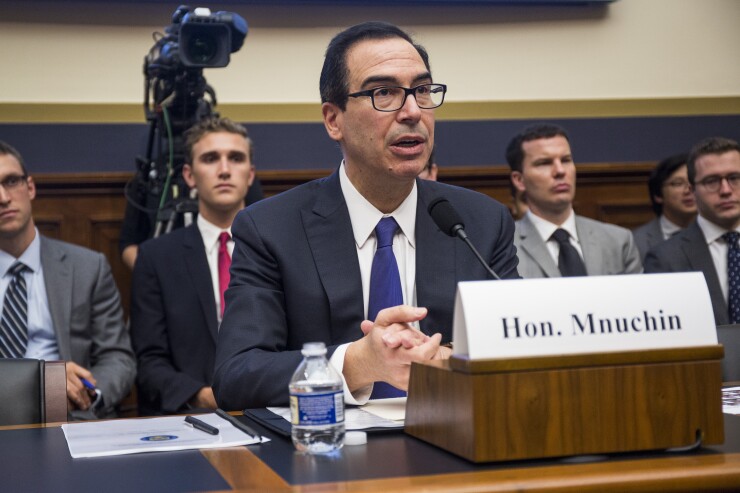WASHINGTON – Increasing federal debt service costs, the expected impact of tax reform and rising entitlement spending are positioned to weaken the affordability of federal debt, Moody's Investors Service said in a report released Thursday.
“We expect the debt affordability numbers to get worse next year,’’ Moody’s Vice President Sarah Carlson, the lead author of the report, said in a phone interview.
The report was issued because the situation, although long anticipated, is crystalizing, Carlson said.
The Moody’s report said the U.S. “stands out for having the least affordable debt burden among Aaa-rated sovereigns and G7 countries based on our projections of the interest-to-revenue ratio in 2017.’’
The report came out as the U.S. Senate on Thursday prepared for its August recess by confirming dozens of noncontroversial presidential nominations and voting on the FDA Reauthorization Act of 2017. The House began its August recess last week.
However, the two chambers face a Sept. 29 deadline for acting on the federal debt limit.

Treasury Secretary Steven Mnuchin said in a letter last week to congressional leaders that it “is critical that Congress act to increase the nation’s borrowing authority’’ by that date.
Mnuchin discussed the debt limit Tuesday morning in a meeting with Senate Majority Leader Mitch McConnell, R-Ky., and Senate Minority Leader Chuck Schumer, D-N.Y.
The three agreed the debt limit needs to be “done sometime in the next month or so,’’ McConnell told reporters afterward.
“And we are going to be looking for a way forward to do that together to make sure America continues to never, ever default,’’ McConnell said.
Schumer told reporters Tuesday that the Republican majority in the House will be the key to raising the debt limit. “Before we can address the debt limit, we have to know where they’re at,” he said.
The Moody’s report said the U.S. “ranks third among this broad peer group on interest-to-gross domestic product, surpassed only by Italy (Baa2 negative) and Canada (Aaa stable).’’
Moody’s said its triple-A rating for the U.S. is stable.
There are numerous strengths in the U.S. that counter balance the federal fiscal problems. "You have some very important structural strengths like the role of the dollar, the depth of the U.S. capital markets, the diversity and the size of the U.S. economy, the relatively still strong performance expectations that we have for the U.S. economy,’’ Carlson said.
But there are challenges. "I think that the point that we are making is, that simultaneously you have these upward pressures on entitlement spending plus you have upward pressures on interest rate on debt servicing costs,’’ Carlson said. “Which means it squeezes all other items of expenditure unless something happens either on the entitlements front or unless the U.S. chooses to run higher deficits.’’
The report said that even if Congress and the White House take steps to stabilize the debt trajectory, the expected rise in interest rate over the next five years will have a major impact.
In addition, Treasury already has taken advantage of the current era of low interest rates to refinance most federal debt securities.
“Over 90% of fixed-rate Treasury securities outstanding as of 31 May 2017 were issued after 2008 and already carry historically low coupons,’’ Moody’s said. “For another steep drop in interest rates to create similar opportunities to extend the average maturity while reducing overall costs, interest rates would have to cross into negative territory.”





